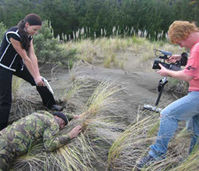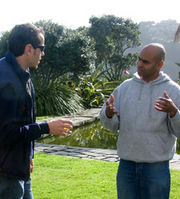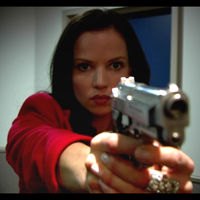Memories of Tomorrow - the movie
The new action thriller by Writer/Director Amit Tripuraneni. From Auckland, New Zealand.
Published Aug 11, 2005
[an error occurred while processing this directive]
Edit page New page Hide edit links
By Mr. Corey Boutilier
August 11th, 2005
Tell me about yourself? Also, your shooting experience? First Film? Been to any festivals?
I came to NZ in 2003 to attend South Seas Film & TV School. That year at school had a huge bearing on my professional as well as personal life. I thoroughly enjoyed my time there and learnt heaps. At the end of the course –the school wanted someone to help out with post production department and since I had specialized in editing, I applied for it and got the position. So I made ‘Memories’ over the weekends while teaching 5 days a week at the film school.
The shooting experience on "Memories of Tomorrow" was fantastic because I had worked with Lance before and we are on the same wavelength on what we want to see on screen and what looks good and what doesn’t. This meant that most of the time – I would do a scene block through on location with the actors and Lance would follow that scene and look for visuals and by the time it came to shoot – he would capture what we wanted for the movie, so it was fun working with him. Obviously – everyone on the cast and crew had a ball on the film because most of the time the shoot would be really relaxed and casual (we only worked more than 8 hours a day on 2 occasions). Everyone was just fantastic in believing the vision and pouring time and energy into the movie and making the dream a reality.
The response to ‘Memories’ has been overwhelmingly positive, even though it is our first film. The movie has been selected to screen in about 4 festivals to date – 1 in NZ, 2 in USA and 1 in Germany and at the same time has been picked up for international distribution by York Entertainment while Arkles Entertainment picked up the NZ/Australia rights – which for a first ‘no budget’ film is pretty remarkable. I haven’t had the chance to travel to any festival abroad because I don’t have any money and there are no private investors or funding agencies that support travel for an unknown independent film maker. But the response at Asia Film Festival was fantastic with complete strangers walking upto me after the screening and telling me how much they enjoyed the film and how they didn’t believe that we did it without any funding – that’s the best kind of satisfaction –getting direct feedback from the audience.
What did you shoot on and why? Was it a good decision?
We shot ‘Memories of Tomorrow’ on a Panasonic DVX100. We decided on that camera after trying out all the available low end professional cameras available at that time like Sony PD-170. Both Lance Wordsworth – the DP on the film and me, had graduated from South Seas Film & TV School and had done several short films on consumer cameras to practice our craft. After we finished school – I always kept saying to Lance that I wanted to do a movie within an year and Lance was thinking of buying a camera to get freelance camera jobs. He did several tests and he liked the DVX100, which I liked heaps as well because of the way it processes colour information, so he bought it and that immediately landed him a paid gig with a production company. So that influenced the decision a lot because we did not have any budget and that meant that we did not have to hire out a camera to shoot the movie. The other influence on that decision was the 25p mode available on the came! ra {which at that time was the only low end camera providing that option} and the cine gamma technology – which made the images look cinematic by taking away the harshness of digital video.
In retrospect- it was a really good decision because we saved heaps on camera rental combined with getting some fantastic looking images – which added to the quality of the movie.
What process did you go through to find your actors? Did you have anyone in mind when you wrote your film, or did you have an open casting call? Who are your actors?
With all the earlier short films that we had done till that point, we would rope in our friends from film school to act in them but with the movie – I knew from the start that for the movie to be marketable and believable I needed to cast the lead roles with people who fit those parts instead of using friends. I had worked with Rachel Gilchrist, when she was doing the On Screen Acting course at South Seas Film School, when she acted in one of our short films and in a music video - I knew that she fit the role of Tanya perfectly and all I did was ask her if she would be interested in doing a movie with me and she agreed to it, based on the wonderful experience we had doing the short film and the music video. For the other two leads – I talked to Maggie Tarver, who teaches acting at the school and she liked the script and referred me to actor’s agencies. I promptly sent the first draft of the script along with the stuff we had done earlier and told them that w! e had no money to do the movie and had no funding, so whoever was interested would have to work for free – on the weekends. Kathryn Rawlings, one of the leading actor’s agents liked what we were trying to do and pushed the script to actors in her books. I was browsing through her website and found Ray Trickitt’s profile – he had done major TV serials in UK as well as NZ and I thought he matched the kind of person I would like to play Roger and told Kathryn about it. She then pushed the script to him and asked me to follow up. I met up Ray and had a long discussion over a cup of coffee- infact several cups of coffee and explained to him how I intended to make the movie, what I saw in his character and other completely random things. Ray took a day to think over it and said yes to the movie. The most challenging role to cast was John – because on the script it was a complex character with lots of internal conflict and for someone to pull it off would have been a miracle. I met up with! 3 actors at different points of time – who agreed to do it but then had to pull off because of circumstances and I was left in a difficult situation with less than a month to start production and without a lead actor. I then re-looked some of the profiles I had skipped earlier and Richard Thompson’s profile stuck out – he had an unconventional look {which is the reason I skipped him the first time around} and thought it would be a really interesting experiment to try him out. Richard came in for a meeting with me and the moment I saw him, I knew he was John. And I really am thankful for all the pains which we had to go through the casting of that role because he brings that character alive in the way I couldn’t have imagined it.
Where was "Memories of Tomorrow" shot? What is it like shooting in New Zealand? Is the community supportive?
The movie has been selected to screen in about 4 festivals to date – 1 in NZ, 2 in USA and 1 in Germany and at the same time has been picked up for international distribution by York Entertainment while Arkles Entertainment picked up the NZ/Australia rights – which for a first ‘no budget’ film is pretty remarkable.
The movie was shot mainly in locations spread across Auckland, New Zealand and we also shot across North Island –capturing some beautiful locations like the Bethells sand dunes (which has been used extensively on ‘Hercules’ & ‘Xena’), Rock formations at Te Awamutu (for the opening rock climbing scene) etc.
We were very lucky with this movie because New Zealanders by nature are really warm and helpful people and whenever we told people that we were doing a movie without any money and that we needed help –they would go out of their way to make things happen. Like ‘Spencer on Byron Hotel’ – a 4 star hotel, blocked off 2 rooms for 5 days, so that we could shoot in their hotel and this was made available free of charge, and similar incidents happened all across – the main mansion we shot in, the bookshop, the sand dunes, the airport, the night club –everywhere, we received massive support and it was a really humbling experience.
Also we had a small crew most of the time with minimum being just 2 people to a maximum of 7 people at any one point in the shoot and the beautiful thing about NZ crews is their ‘can do’ attitude, in absence of unions and stuff, people tend to back up each other and support each other when need be. The production assist would sometimes double up as boom operator and other such incidents –which makes working with people such a pleasure because it is like a family trying to make things happen, instead of a rigid chalked out film crew who would do only their stuff. So the production part was heaps of fun.
Why a film about assassins? What drew you to this script?
I started writing the script as a new years resolution. I wanted to make a movie, no matter what the odds and I tried collaborating on the script but the deadline I set for the movie seemed unrealistic and unreasonable to them and so they never got on the ship –so I decided to write the script myself and try and meet my own time frames. I wanted to do either an action thriller or a horror film because these genres tend to be more marketable to distributors (especially for a first time film maker). I considered horror but knew that we did not have a budget to pull off a good horror, so decided on action thriller. And with that in mind I started writing the script.
I knew the limitation I had with the script was that I couldn’t make it an out and out action movie due to budget constraints and the other thing which always irritates me while seeing an action thriller is if it doesn’t have well defined characters. So I wrote three main characters first and started placing them in different situations, to see how they would react to each other and as I played out the scenarios –the story started forming itself and making the main characters assassins just added that extra element of danger and uncertainity through out the film as the story then became unpredictable.
What were some of the challenges to shooting your film? Any stories about your shoot where something went wrong but you rose to the challenge of directing?
The biggest challenge to shooting the film was obviously not having a budget. The movie in total cost us NZ$ 15,000 from pre production to post production – which in the bigger scheme of things is nothing at all. Since we did not have any money and could not pay anyone, we decided that we were going to film the movie over the weekends. Which also brought a fresh challenge – scheduling people, scenes, locations to make sure that we shot the script and we had made it a policy that if any paid work came up for the actors, we would re-schedule things around them. So the production was a big challenge all the way through, because of the lack of money.
One of the stories which set the mood for our ‘can do’ attitude through out the movie was on the second day of shoot. The person who was supposed to be audio recording rang me up at 3.00 AM in the morning {when the call time was 6.00 AM} and said that he could not make it to the shoot – which meant that I had 3 hours to find a replacement audio recordist. Since I could not think of anyone, I decided that I will record audio myself along with directing on that day. It was a big challenge and the rest of the crew were really surprised but it set the tone that we had to get this movie done one way or another {I ended up doing audio recording for half the movie}. I am really happy that I did that because I saved myself a lot of heart burn when one of the crew members was not available.
Ever been the USA? How is where your from different from USA?
No never been to the USA but the editor for ‘Memories’ – Benji Dalton is from USA and he also worked as a PA on a Hollywood feature and all I can speak on production would be based on what I have heard from him, so would be unfair to comment on but as far as the audiences are concerned – I think USA is much more open to independent films and the audience is more accepting than NZ audiences, who tend to be more critical and judge everything against major budgeted movies.
[In Technology]
Additional Events at ProFusion 2011, DV Expo East, and Columbia College Chicago May 26, 2011
[In Resources]
Fest to fete special guests Vera Farmiga, Paul Haggis; Mike O’Malley joins Anne Meara as hosts of Late Night Storytelling May 26, 2011








Add a Comment
Please be civil.